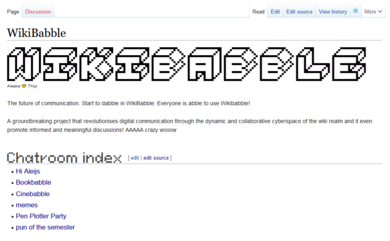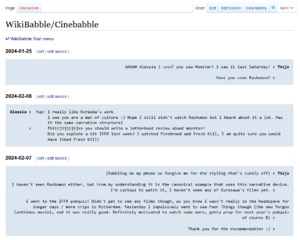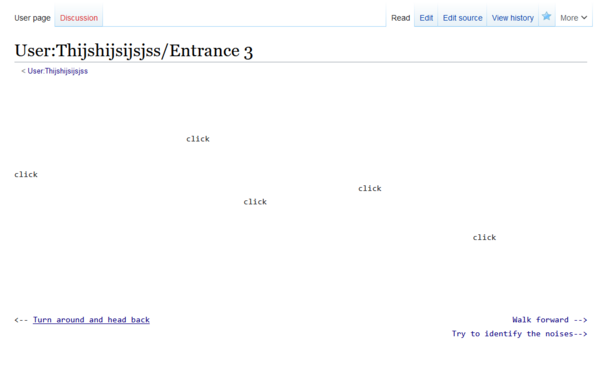User:Thijshijsijsjss/T2 Assessment
[intro text]
Setup
Connect your device to a big screen facing the audience.
Ask the audience about audio documentation.
Student: Would it be okay for me to record the presentation? [show audio recorder] Not the panel discussion, of course.
If yes:
Student: Okay, great!
Start audio recording.
If no:
Student: Okay, no problem!
Put audio recorder back in backpack.
If student is not ready to start, but asked or prompted to do so:
Student: Sorry, I'm not quite ready yet.
If student is ready to start, and asked or prompted to do so:
Student: Yes, I am ready!
If student is ready to start, but not asked or prompted to do so:
Student: I'm ready to start. Are you? [Look around questioningly]
Wait until tutors are ready to start.
Introduction
Welcome the audience and introduce yourself.
Student: Hello. Thank you all for being present today for my assessment.
Introduce the format of this presentation.
Student: This is a self-documenting presentation: a self-contained, self-referencing compilation of 'slides', multi-media and script. Today, I will perform this presentation for you. Most likely, I will not follow the script verbatim.
Tutors: That's okay!
Student: Thank you. Let us get started.
Presentational content
Themes
Methods
Explorations
Wrap up
Appendix: Selected Projects Catalog
EtherPatches
The Hitchhiker's Guide to an Active Archive
Archival Oceans
Penplotting
Pen holders and alignment tools
Plothatching
twitchplaysplotter
Wiki
WikiBabble
Student: WikiBabble is a project I initiated with Alessia that uses the community wiki as a messaging service. It facilitates different chatrooms, like personal chats, channels for memes and organization, and topic specific chatrooms. These (uses mouse pointer or finger pointer to point at images below) are two screenshots of WikiBabble: the chatroom index (left) and the Cinebabble chatroom (right), which we use to discuss cinema.
Student: I am intruiged by the tension of these intimate conversations through an explicitly public medium like this wiki. And that's not just for style, either. This way of chatting actually provides new tools in conversing, like how it facilitates multiple 'levels' of communication.
Student presses 'Edit source' for this section, highlighting the HTML comment and alt text.
Wiki Wanderer
Student: During the first few days, I was asked a lot about 'my practise'. This is a daunting question. When we were given the black slate of our user pages, I decided I'd rather show something that intrigues me, instead of listing these interests. On the surface, Wiki Wanderer is a Choose Your Own Adventure story: through deciding between different branching options, a wiki wanderer navigates a their story. However, this is a wiki! Any user can edit anything! This projects invites its players to do so, becoming not just a 'choose' your own adventure, but a 'create' your own adventure. For example: this (use mouse pointer or finger pointer to point) option was added by Victor.
Student: Anyone being able to edit anything is a unique feature of the wiki as a medium, that's what sparked this project for me. Besides, I noticed that some classmates weren't as comfortable with wikiing, and I hoped this would provide them with an invitation to experiment, or at least show that such a place need not be used solely for archaic and formal practises. Looking back, it's interesting to see that the first project I did since starting XPUB was a CYAO game. It was an early exploration of a continuing interest of interactivity, story telling and bending of static media. Through conversations with Michael, Rosa and Anita, these interests would later be explored further in The Hithhiker's Guide to an Active Archive. That these projects flow into each other through such collaborations is a new and wonderful experience for me.



